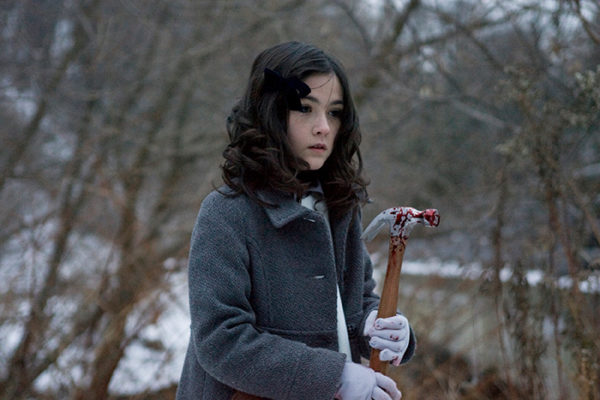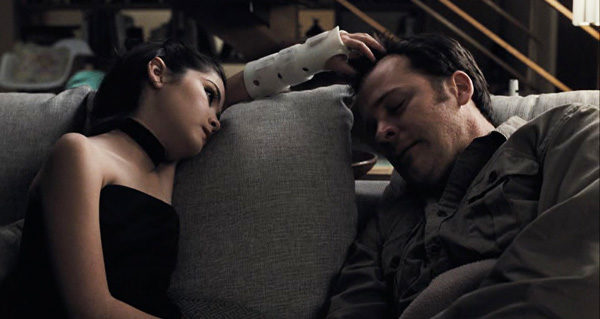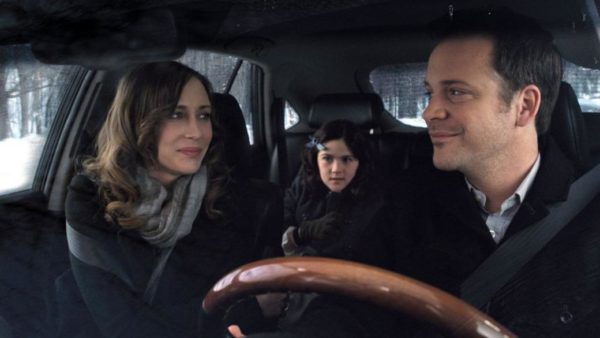
In He Said/She Said, critics Joe and Valeska dissect a film in a back and forth email exchange. Previously, we spent some time gazing at the moon with Verónica (2017) and her siblings. This time, we’re going the adoption route with Jaume Collet-Serra’s 2009 Orphan.
Let’s bitch it out…
Synopsis: “A husband and wife – John (Peter Sarsgaard) and Kate (Vera Farmiga) – who recently lost their baby adopt a 9 year-old girl Esther (Isabelle Fuhrman) who is not nearly as innocent as she claims to be.”
HE SAID
After a slight delay*, we are back and we’re talking about this glorious little mindf*ck of a movie. And while I am so, so tempted to just jump straight to the ludicrous, over the top reveal, I’m actually going to delay and leave it for you to unpack.
*To clarify: we did actually write about A Quiet Place, but it was such a significant conversation that it ended up becoming an Anatomy of a Scream Squad Talk.
I have seen this film twice before. Once when it first hit video and then a few years ago. I’ve found that each time my memories of it are a bit hazy. Aside from that gonzo twist, I tend to remember a few key sequences: the runaway car, the flaming treehouse and that super uncomfortable “seduction” scene between Esther and John.
Two things stood out to me this time around: 1) the men in this film are toxic and 2) this is actually more of a domestic drama wherein Esther’s role is to expose the fallacies of the perfect American family.
Let’s start with the men. There are really only two significant male roles in the film: John and oldest child, Danny (Jimmy Bennett). Sarsgaard is really great in a relatively undercooked role because he’s such a jerk. He’s a cheater, he tells half truths, and he’s the “good” dad who shames his wife for her parenting skills. He doubts her and when things go to shit, he calls in the shrink (character actress Margo Martindale) and he even tries to get Kate committed! I remember him doubting Kate, but it never occurred to me how legitimately terrible he is!
Danny is a more complicated. In terms of child characters, he’s quite annoying. His role early on is to be the petulant brat who refuses to accept the new adopted sibling and in that regard he’s successful. The scene that most fascinated me is when he’s shown shooting the pigeon with the paint gun. The scene exists to foreshadow Esther’s attempted murder of him later, and to reinforce that she’s unafraid of killing, but it also confirms that he’s also a burgeoning psycho. Yes, he cries when he sees that he’s gravely injured the bird, but even children understand that you don’t shoot living creatures. In an alternate universe, Orphan features homicidal lunatic Danny murdering people a la The Good Son.
Moving on to the second point: I was surprised at how much of a family melodrama Orphan is. Within the first few minutes we learn all about the various trials and tribulations of this family, including a miscarriage, child endangerment, alcoholism and, later, infidelity. Obviously the film’s primary conflict is between Kate and Esther, but if you were to say, remove Esther as a malevolent force, her primary function for nearly half the film is really to bring to light all of these simmering issues that have been swept under the rug.
As much as Orphan is about an evil seductress impersonating a nine-year-old child, it’s also about a seemingly perfect looking family barely holding together the facade of their happy lives. It’s even more ironic to me that the film ends without the suggestion of a happy resolution: John is dead and Danny’s recovery is implied but not shown. Only Kate and cutie Max (Aryana Engineer) come out relatively unscathed.
What did you think of the family dynamic, V? And how do you feel about that twist reveal?

SHE SAID
It’s so funny that you mention how vague your memories of this film were — like you, I also had trouble recalling much beyond that twist and a few of the more impactful sequences. I’d even forgotten that my glorious wife, Vera Farmiga, was in it (and texted you about it immediately!) Granted, it’s been a year or two since I saw it last, but the understated family drama aspect of the film really is totally overshadowed by the bonkers absurdity of the adoption storyline and Esther’s little secret, at least on first watch.
On this revisit, like you, I found myself more drawn into the domestic drama slant and the tensions simmering just below the surface of this picture-perfect family. The film does such a great job of gently doling out these hints and revelations — we, like Esther, get to learn about the Coleman family gradually and organically.
In a shocking twist, I think that I may have a little bit more sympathy for Sarsgaard’s John Coleman than you do. Just a smidge, really. Yes, I agree: he’s a total jerk for a lot of reasons and completely disrespects his wife’s (sound, as it turns out) judgment regarding Esther’s behaviour (which is pretty unforgivable). But…having had a little bit of experience dealing with a partner’s addiction problems, I can sort of understand why he takes a hardline stance later on in the film regarding the discovery of the wine bottles, especially in light of the near-loss of a child due to negligence during Kate’s rock-bottom period and the bang-up frame-up job that Esther manages to pull off.
That being said, my sympathies throughout the film are obviously with Kate (and not just because I adore Vera Farmiga). Kate is a flawed and utterly relatable character. She isn’t always adept at emotional regulation and she is constantly battling her demons. But one of Vera Farmiga’s greatest strengths as an actress is her ability to portray ambivalence — her Kate is complex and conflicted, seeking and struggling. She’s clearly trying her hardest to be the perfect mother and wife, even as she is unable to truly forgive her husband’s past infidelities and struggles to cope with her own depression. The Coleman marriage is fascinating enough to carry the film even without their deadly new daughter.
And then, we get that reveal. Since you seem reticent, I’ll be the one to go full-spoiler here.
Esther, the alleged nine-year-old Russian girl, is actually a sociopathic 33-year-old escapee from an Estonian psychiatric hospital with hypopituitarism and a body count of at least seven victims. And she is LOOKING FOR LOVE. More specifically, she wants to get down and dirty with her new “dad”, which she attempts to do once she’s emptied the house of all obstacles to her libidinous goal.
Yes, it is as crazy as it sounds.
The twist is extraordinarily over-the-top (Orphan is similar to 2016’s The Boy in that respect), but for some reason it works? Maybe it’s because the melodrama is so grounded and truthful, and I was already solidly on-board. Maybe I just like the spectacle of black-light smut. Either way, I was there for it.
I’ll stop hogging the spotlight and turn it over to you — what are your final thoughts on Orphan? And, more importantly, what do you give it for your final score?

HE SAID
Lol. My notes from the latter half of the film reads “That black light painting is…intricate.”
Unfortunately I ended up enjoying the rewatch less than I had hoped. Part of my struggle was how early the narrative tips its hat about Esther’s violent tendencies. The dwarfism reveal is the kicker, but it’s obvious from the second day that she’s in the house that Esther is a bad seed, which just makes it frustrating when everyone and their dog reminds Kate that she’s a batshit crazy paranoid with addiction problems. I think holding off on Esther’s true nature a little longer would have added speculative fuel to Kate’s fire and helped me to hate everyone a little less.
The other element that doesn’t work for me is technical: the sound cues. This is a film that relies too heavily on jump scares (John pops up behind Kate in the medicine cabinet mirror!), but – more frustratingly – beats the audience over the head with “gotcha!” notes on the soundtrack. It cheapens the film, particularly in the early part when the dysfunctional marriage is at the forefront, almost as though the production team don’t trust their audience to invest in this portion without juvenile scares.
I’m not about to argue that Orphan is a great film, but the cast is surprisingly stacked (CCH Pounder, we hardly knew ya!) and there’s a meaty foundation supporting the more ridiculous twists. At times it seems like the film is battling itself: is it more of an adult drama about a family battling to overcome tragedy and vice…or is it a silly little trifle about a murderous dwarf who likes to kill strangers. My favourite sequence – Esther’s smothering of Danny in the hospital followed by Kate’s over the top smack on her adopted “daughter” – belies the struggle. Orphan is a bizarre little oddity that works and fails in equal measure, though it has to be seen to be believed.
My score: 6/10.
SHE SAID
It works less for you on the revisit, and more for me! Funny how that works. I’m going to match your score, for once — Orphan is a solid 6/10 in my book, although I do agree with you about the film showing its hand far too early. Good pick, Joe!
————–
That’s a wrap for this time. Next month: we’re venturing back into foreign film territory with the black and white Western vampire feminist film A Girl Walks Home Alone. See you in late May!